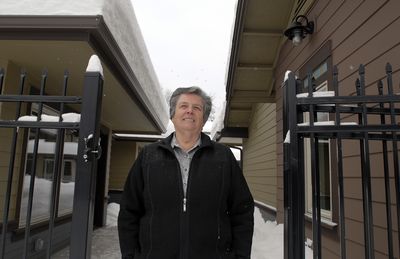Retirement is hardly the end of her work
Volunteer lends expertise to community projects

A year ago, Arlene Patton retired from her job overseeing the Eastern Washington region of the U.S. Department of Housing and Urban Development.
It didn’t last long. Within weeks, the Spokane woman was doing for free some of the work that had once earned her a salary.
Patton hopes her volunteerism is part of an emerging trend for 2009, in which retirees use their time and expertise to better their communities. She and others believe it may be the thing to get our country back on strong economic footing. Here’s her story.
Patton was born in 1944, the fourth of 11 children, and raised in the lower Yakima Valley. She made her way to Spokane after high school to attend Kinman Business School, and she worked as a bookkeeper until “one day I decided that I wanted to see what Alaska was all about.” Oil production was starting up there, and Patton took a job working with Native tribes formulating accounting structures within their housing authorities.
She married, had two girls, and in 1978, her husband left. She became a single mother supporting two children before it was commonplace for women to do so.
“You learn by your mistakes,” she tells young people now. “Don’t let them defeat you. I stumbled in 1978. Did it scare me? Absolutely, but it made me stronger.”
Eventually, she was named head of HUD in Anchorage. By 1998, her daughters had gone off to college, and Patton felt unsettled – an unsettling feeling for a woman known for her strength.
So she said yes to a volunteer gig overseeing the building of a home for a single woman and her five children. The home was in a neighborhood where gangs were threatening, and the project was an attempt to get community members visible in the neighborhood.
It was an all-women-built Habitat for Humanity home, and in the end, 2,500 women joined in. Patton painted, roofed, Sheetrocked. As she looks back on her three decades in the housing business, that project gives her the most pride.
“People left there committed to paying attention to what happened in their neighborhood. Two years ago, I went back and it was as well-maintained as the day they got the keys,” Patton said.
A year ago, Patton faced another transition. She was retiring from HUD.
She spent the past seven years of her HUD career in Spokane getting to know almost all the people involved in Inland Northwest housing issues.
“When I retired, I asked community members to give me 60 to 90 days, and then we’ll talk about what you’ll have me do,” said Patton, 64. “I was going to give back to the community, but I was going to pick and choose.”
She took her daughters, Mitzi and Gigi, their husbands and her two grandchildren on a cruise through the Hawaiian Islands.
The community requests began as soon as she returned. She said yes to the Habitat for Humanity Spokane board, yes to a Spokane Urban Ministries housing project, yes to a group that’s crafting a 10-year plan to end homelessness.
But Patton’s biggest yes came last March when she agreed to lead the Regional Affordable Housing Task Force, an effort prompted by the displacement of low-income residents during the Inland Northwest housing boom.
“Arlene, God bless her, retires and doesn’t even retire. We talked to a lot of people about who should (lead), and Arlene was the unanimous choice,” said Mike Adolfae, community development director for the city of Spokane. “We said we wanted it over by the end of the year. She said, ‘I can do it.’ People were skeptical, but she laid out the schedule. She was pragmatic, direct and demanding.”
The task force was made up of 20 men and women representing Spokane, Spokane County and Spokane Valley, as well as homebuilders, businesses, real-estate agents, finance people, nonprofits and affordable housing advocates. They gathered monthly to hammer out a plan to ensure the long-term viability of affordable housing in the region.
They held their last official meeting Dec. 17 and emerged with a draft plan, to be finalized in January. After that, Patton and other committee members will pitch the affordable housing plan to government, business and community stakeholders.
“I don’t think anybody else could have pulled it off. She’s good at herding cats, and there were lots of cats,” said Avista Corp. chief economist Randy Barcus, who served on the committee.
Patton hopes more retired people use their time to better their communities. You can be picky about your projects, she says, and ignore both workplace politics and bureaucracy.
For instance, during her work life, Patton was required to refer media calls to HUD headquarters in Washington, D.C. Now she can talk for herself, though she’s still not big on spotlights shining her way. Her mantra to her HUD staff was always “There’s no I in team.”
Though the job market is dismal now, economists – including Avista’s Barcus – predict a labor shortage after the recovery begins, in part because older baby boomers will feel financially confident enough to retire. But some of those retirees will be needed to keep things going.
“Folks of my generation need to stay connected to show young people how they can move forward. We’re so hesitant sometimes,” Patton said. “In 2009, I think President-elect Obama will ask us to get involved. People will respond – and feel better for doing it.”